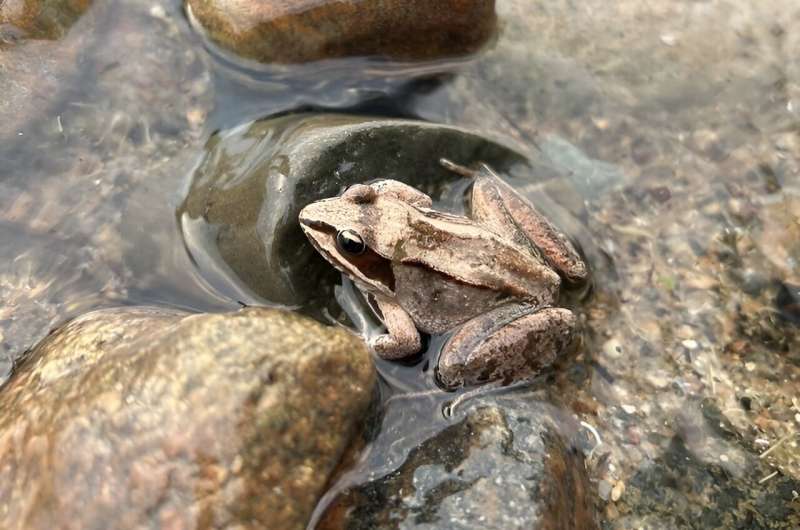This article has been reviewed according to Science X's editorial process and policies. Editors have highlighted the following attributes while ensuring the content's credibility:
fact-checked
peer-reviewed publication
trusted source
proofread
Researcher finds that wood frogs evolved rapidly in response to road salts

When we think of evolution, we think of a process that happens over hundreds or thousands of years. In research published in Ecology and Evolution a team led by Rick Relyea, Ph.D., professor of biological sciences and David M. Darrin Senior Endowed Chair at Rensselaer Polytechnic Institute, found a species of frog that has evolved over the course of merely 25 years. The adaptation was spurred on by something many assume is innocuous: salt.
"We've been applying de-icing salts to reduce car accidents in snowy and icy conditions in the United States for 80 years, and we currently apply four times more road salt than we did in the 1970s," said Relyea. "However, the number of studies on its impacts to our environment are relatively few. We're beginning to learn that when salt drains into fresh water, it can kill animals, stunt the growth of fish, cause sex changes in frogs, and make animals more prone to diseases."
"Amphibians like to breed in wetlands, which have smaller water volumes than lakes, so the salt concentrations in wetlands can accumulate to very high levels," said Relyea.
"In our study, the highest salt concentration was found in a wetland adjacent to a parking lot that's been there for 25 years, where the salt concentrations are nearly 100 times higher than in pristine wetlands. We found that over the course of just 10 generations, these wood frogs evolved a much higher salt tolerance."
The research team collected frog eggs from nine populations and allowed them to hatch into tadpoles. Then the team examined whether populations of tadpoles from more salt-polluted waters had evolved higher salt tolerance.
Tadpoles collected from the saltiest wetland experienced a notably longer time until death when exposed to salt than the eight other populations collected from other areas close to roads and with varying levels of salt, suggesting an evolved tolerance. However, the frogs' ability to adapt does not mean that we should expect them to survive if salt levels increase even more.
Relyea hopes that insights gained from this study will help protect many species of plants and animals that are being exposed to salt pollution.
"The fact that these amphibians rapidly evolved to deal with high salt levels suggests that we have time to avoid extinction, in this species and probably many other species," said Relyea.
"Fortunately, cities and towns around the country are learning how they can apply less salt with the same level of safety, by applying it in smarter ways. Everyone across the political spectrum can agree to this win-win proposition: we can apply less salt and protect the environment, while maintaining safe roads and saving money for governments and taxpayers."
"The effects of human activity on our environment must be understood and mitigated," said Curt Breneman, Ph.D., dean of Rensselaer's School of Science.
"Thanks to Professor Relyea's research, we have evidence of the effect of road salt on one species. Fortunately, while these results show that certain amphibians can adapt quickly to some environmental toxins, they also provide a warning that scientific and policy solutions must be found to mitigate such pollution."
Relyea was joined in research by Brian Mattes, Candace Schermerhorn, and Isaac Shepard of Rensselaer.
More information: Rick Relyea et al, Freshwater salinization and the evolved tolerance of amphibians, Ecology and Evolution (2024). DOI: 10.1002/ece3.11069
Journal information: Ecology and Evolution
Provided by Rensselaer Polytechnic Institute



















